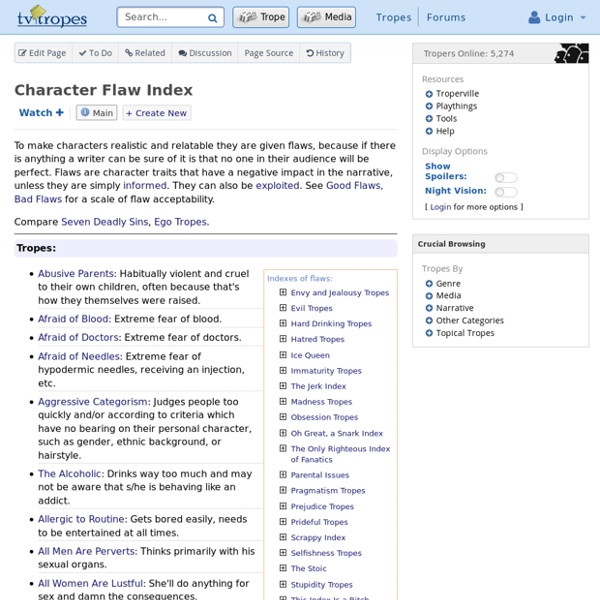



http://tvtropes.org/pmwiki/pmwiki.php/Main/CharacterFlawIndex
Related: Writing8 ½ Character Archetypes You Should Be Writing Here’s the thing about character archetypes: everybody’s got his own take. Do you run with Joseph Campbell’s gazillion and one Jungian archetypes? How about Dramatica’s double quad of eight archetypes? Or maybe screenwriter Michael Hauge’s simple offering of four main players? Nothing wrong with running with all of them. The fact that archetypes are both universally applicable and yet endlessly varying provides authors with both structure and flexibility.
Character Trait Cheat Sheet - Kris Noel In order to create a relatable character, you must think about them as having several layers. Knowing and choosing character traits is important because you don’t want them to be one dimensional. It’s all not as simple as saying “this person is mean” or “this person is kind”. Think about the people you know in real life. They all have some sort of defining trait that makes them different from everyone else.
100 Character Development Questions for Writers - Gather.com : Gather.com These 100 Character Development questions, written by my friend Rich Taylor, have come in handy so many times for me as a writer! I put Michael through these questions as I was working on his character development, way back when he was brand new to me and we knew nothing about each other. I learned a ton of stuff about who he was, and also I learned a lot about how I wanted to approach telling his story. Do Your Characters Have the Right Flaws? By Janice Hardy, @Janice_Hardy “Characters must have flaws” is one of the cornerstones of fiction. Flaws create more interesting people, they give you the foundations for your character arcs, and they help you write more relatable stories.
Physical Descriptions - List of Hair Colors Hair Color List (Note: an updated and expanded version of this list appears in my 15K-word book How to Describe Hair and Skin. See below.) [First, my profound apologies to the vast majority of readers who don't steal content, but I have to state the following. The 12 brand archetypes all successful businesses are built on Successful brands have a strong sense of identity, one that mirrors the hopes and aspirations of their customers. But finding your voice – especially as a small business – can be difficult. And expensive. Identifying your brand archetype from this list will save you time and money and connect you instantly to your audience. Why do so many films seem to have the exact same characters in them? The rugged action hero with a tortured past.
25 Things You Should Know About Character Previous iterations of the “25 Things” series: 25 Things Every Writer Should Know 25 Things You Should Know About Storytelling And now… Here you’ll find the many things I believe — at this moment! — about characters: Utopian, Dystopian, Fantasy Fictions » Final Essay: Gender in Speculative Fiction What makes an author give their characters the personality traits that they do? Generally speaking, in every book that you read or film that you watch there is one distinguishable trait that you fall in love with that the main protagonist has. This could be some special power that they have, or a personality quirk, or even a scar (yes, I am talking about you, Harry Potter). One of the key traits that writers quickly distinguish is if that particular characters is going to be portrayed as masculine or feminine.